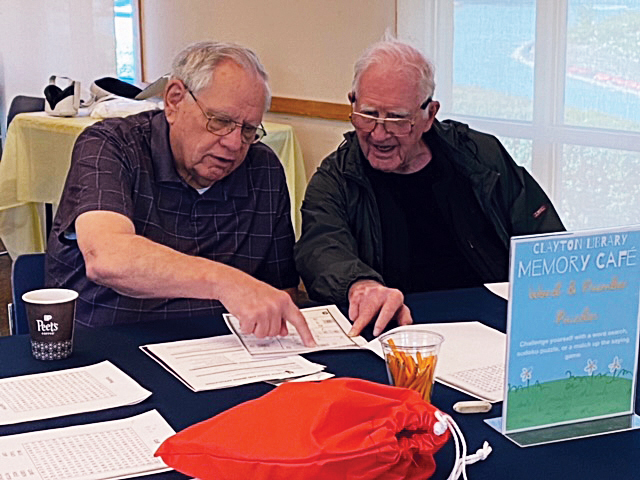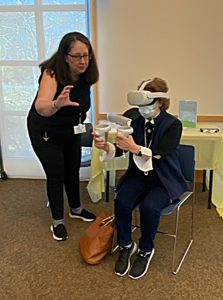Creating Clayton’s Memory Café a labor of love

CLAYTON, CA (May 1, 2023) — The slow robbing of a loved one’s mind and memories due to dementia and the painful reality that her own mother didn’t recognize her served as the impetus for Dori DeCommer to pursue establishing a Memory Café at Clayton Community Library.
It is the second one in Contra Costa County.
The library’s Memory Café, which next opens on May 20, is offered the third Saturday of every month from 10 to 11:30 a.m. in Hoyer Hall, and provides variety of activities all designed with the singular goal in mind of sparking memories with its visitors.
DeCommer, Clayton’s Adult/Teen Services librarian, noted the idea was always in the back of her mind to organize such a program. So, when she learned there were funds for it, she pressed ahead with researching online and reading up to learn what was essential for a Memory Café and the activities that should be part of it. Six months later, Clayton’s was ready to welcome patrons to its April grand opening.
As popular music from the 1950s and 1960s played in the background, the library hall was set up to offer activities like painting for visitors to do, some tables offered playing cards and games like UNO, while worksheets of varying types and puzzles of varying difficulty and embedded assistance were put out on still others.
Puzzles, for example, might include the illustration of a classic car from the 1950s. “What was your favorite car” is a question to ask a Memory Café visitor, said DeCommer to stir memories and begin a conversation with the individual putting it together.
Grand opening
Clayton’s Memory Café is the result of online resources available through Dementia Society of America on its www.memorycafedirectory.com website, and “The Alzheimer’s and Memory Café: How to Start and Succeed with Your Own Café’’ by Jyette Fogh Lokvig PhD, that DeCommer used create an environment with a good mix of activities.
Zohreh Verjdani, of Concord was among grand opening visitors enjoying what was on offer.
Filling in one of the Soduku worksheets, Verjdani liked the mental challenges that different activities provide to keep one’s mind sharp and her young.
She also tried out Wander, a virtual reality device. The Wander App enables participants to use a VR headset, like the Oculus Go, and travel to any place in the world. Recalling her globe traveling days, Verjdani desired a visit to China and for a few minutes she was virtually transported to Beijing.
As DeCommer finished assisting Verjdani, she told her she would bring in a second Wander in May so she can just enjoy going along for the ride next time. And leave the driving to the staff.
“Next month we all can go around the world,” DeCommer said.
Brain stimulation
Ray Bauer, 89, who battles with significant hearing loss these days, also liked what Memory Café is attempting to do. If he hadn’t made the trip out with his neighbor, Steve Gray, through the urging of his wife, Diana, he’d be at home alone.
“I keep my brain stimulated” by still reading financial reports and managing their financials, Bauer said.

Knowing it gets tough as they get older, “we are trying to keep as much brain activity going as we can,” he continued.
Working a word search on offer at the Café, Bauer notes “this was a new challenge for me.”
Gray, 75, was as much as interested in seeing what the county is doing for individuals like himself through the new Memory Cafe.
“I may not need it right now,” he said.
Still, venturing out to the library was a pleasant diversion to the yardwork he otherwise would have been doing.
With a wry smile, though, Gray remembered “those are still going to be there when I get home.”
While April’s turnout was slim, DeCommer is hardly discouraged. She noted library visitors have been taking photos of fliers promoting the Memory Café. Also, there have been discussions taking place with the activity director of a Clayton senior living facility about bringing its residents to the Memory Café for a day out.
Growing interest
So word is getting out giving DeCommer hope that interest in the Memory Café will continue growing with the potential that it could possibly become a weekly experience for those certain to benefit from it.
“We should have more (Memory Cafés) in Contra Costa County, and hopefully this will prompt more,” said DeCommer of the Cafes. “There are advancements being made.”
DeCommer’s efforts are now something of a memorial to those in her family, like her grandfather’s sister who suffered the debilitating effects of the disease, and seeing the onset of it first hand with her own mother.
“My mother in the end didn’t even recognize me,” said DeCommer. “It runs in my family and it’s sure to get me too.”
This program not only serves as a resource for the elderly but for the caregivers of those who get worn down serving loved ones with dementia.
So this is a place too for caregivers to come and talk about it, showing them “they are not alone.”
“It’s hard for loved ones to deal with the pain. They get upset,” said DeCommer. “It gives them a break.”
The Jewish Family & Community Services East offers the area’s other Memory Café program. Also free, it meets the fourth Monday of each month in Pleasant Hill, from 1 to 2 p.m. at the art room of the Pleasant Hill Senior Center.
“The group is social in structure and includes a person with mild cognitive impairment and their loved one in the caregiver role,” said Dee Madnick, JFCS East Bay’s Memory Café coordinator. “We are not a “support group” but it is supportive naturally.”

David Scholz
David Scholz is back in journalism as a freelance writer and photographer after nearly two decades in education. Prior to moving into teaching in 2000, he worked as a full-time journalist since 1988 for rural community and small daily newspapers in Central Ohio and Northern Nevada, and later in California with The Business Journal in Fresno and dailies in the Bay Area, including The Oakland Tribune and The San Francisco Chronicle. More recently Scholz also worked in an editing, writing, and page layout role with the Rossmoor News.
